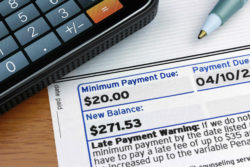 If you were charged residual interest on a credit card even though you paid the bill in full, you could be eligible to participate in this investigation.
If you were charged residual interest on a credit card even though you paid the bill in full, you could be eligible to participate in this investigation.
What is Residual Interest?
Sometimes known as trailing interest, residual interest is the interest that accrues from the date your month’s statement is issued to the date you make your payment. This most often occurs when consumers carry revolving balances on their credit cards.
Even if you call an automated number and hear that your payment has gone through and you have a zero balance or if you log in online and see a zero balance, the credit card company still might surprise you with trailing interest at the end of the next billing cycle.
Why Would My Credit Card Accrue Interest Even Though I Paid it Off?
Banks that issue credit cards
must explain the card’s terms and conditions, but language regarding trailing interest is not standardized. The topic is complicated, and most attempts to disclose the ins and outs of such charges are insufficiently written in a way most of us can easily understand.
Capital One prints a notice that says, “You may owe interest charges even if you pay the entire ‘New Balance’ one month, but did not do so for the previous month.”
Is Charging Me Residual Interest Legal?
Many reputable financial institutions allow a grace period during which a credit card balance can be paid off without any interest charges accruing.
Before issuing a credit card, the bank must inform the cardholder of the rules of the credit cards’ interest charges.
What If a Recent Purchase Doesn’t Appear on My Credit Card Statement?
By law, credit card issuers must send you the monthly statement no more than 21 days prior to the payment due date. This allows you to see the extent of the transactions you made.
If you made any transactions after the close of the billing cycle, those transactions will appear on the following month’s statement.
In most cases, credit card contracts provide a waiver of interest charges if the customer pays off the balance a minimum of 21 days from the end of the current billing month.
How Can I Avoid Paying Residual Interest?
The best way to avoid paying trailing interest is by calling the credit card company and asking for the full payoff amount. The company representative should provide you the amount due at that time and will include any residual interest.
What If I Believe I Have Been Unfairly Charged Interest?
An experienced financial lawyer can help you consider your legal options. We are investigating credit card issuers that might have committed a breach of their own contract, in addition to violations of state laws, by charging residual interest on balances and cash advances several months after the balance has been paid. Among the credit card issuing companies currently under investigation are Bank of America, Chase, TD Bank, HSBC, Ally and Capital One.
Join a Free Credit Card Interest Class Action Lawsuit Investigation
If you were charged credit card interest months after paying off the balance of your credit card, you may qualify to join this credit card interest class action lawsuit investigation.
ATTORNEY ADVERTISING
Top Class Actions is a Proud Member of the American Bar Association
LEGAL INFORMATION IS NOT LEGAL ADVICE
Top Class Actions Legal Statement
©2008 – 2026 Top Class Actions® LLC
Various Trademarks held by their respective owners
This website is not intended for viewing or usage by European Union citizens.















One thought on How Can Residual Interest Be Avoided?
At the end of November I had a seriously past due amount on my Amazon Visa card from Chase. I called and spoke IN PERSON with their collections deot and requested to pay off the amount in full…now they are charging me late fees on residual interest.